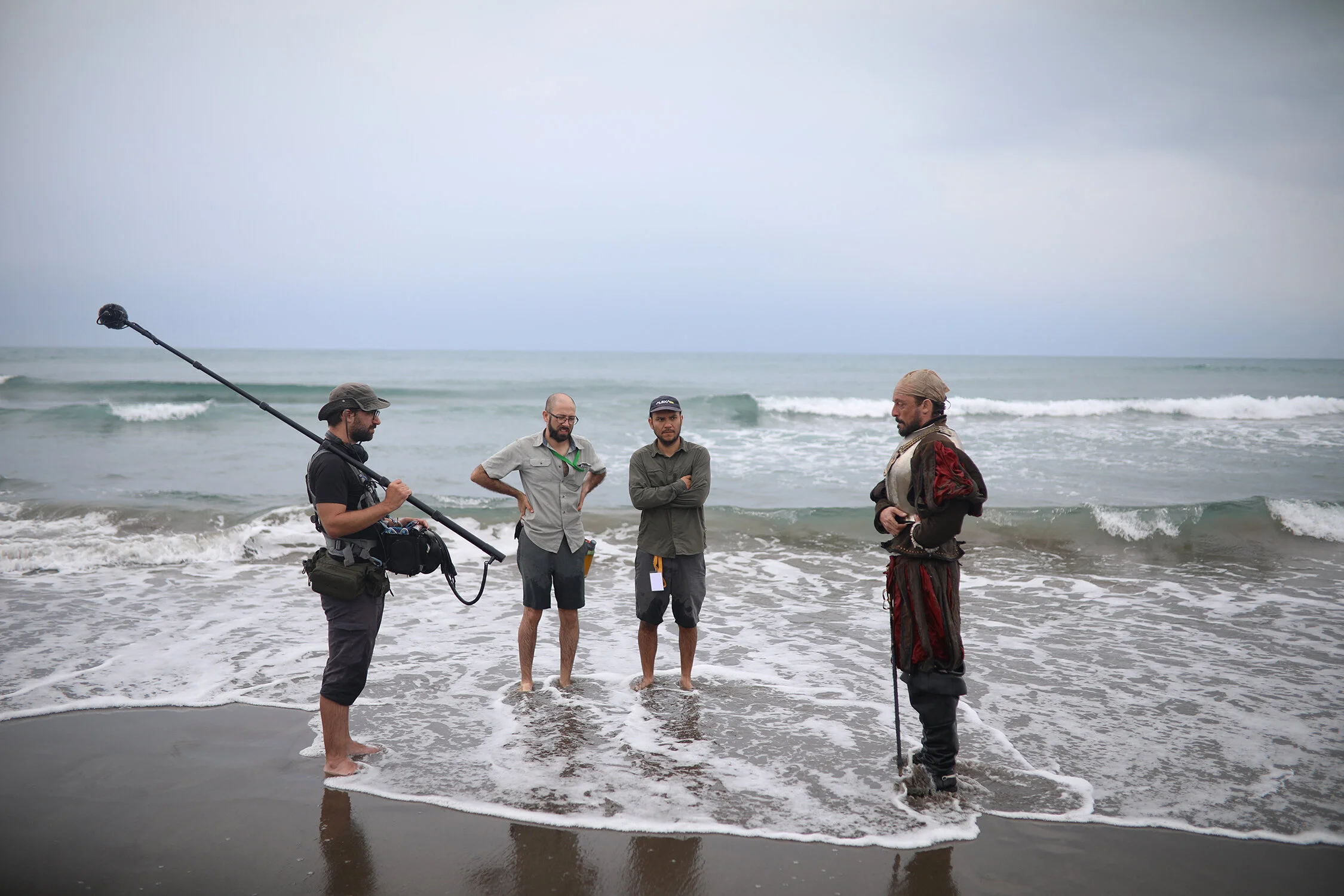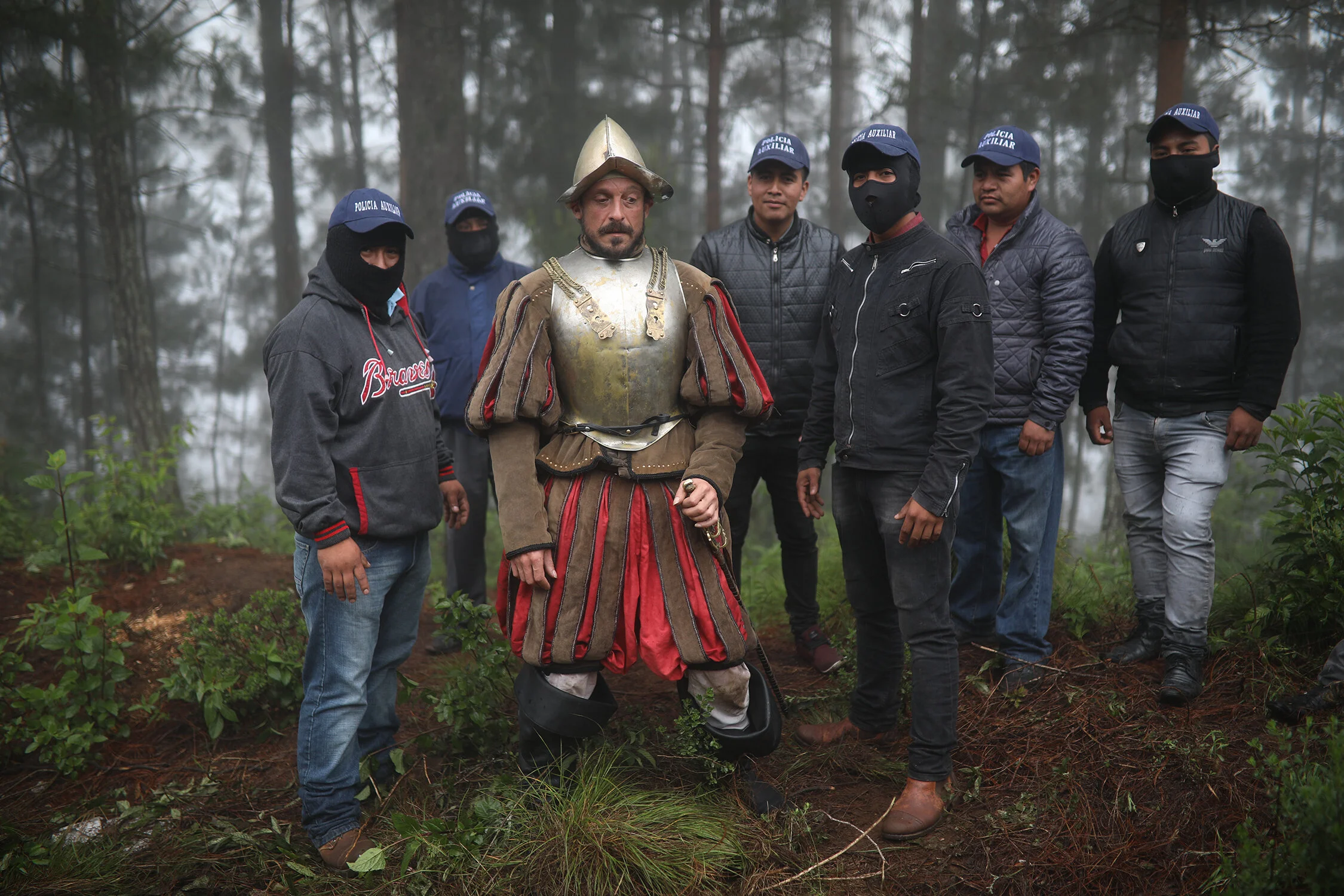By Juan Medina
499, the fourth feature film by Mexican-born American director, recently had its world premiere as part of the Tribeca Film Festival where it won the Best Cinematography Award in the documentary competition, and was also awarded the Special Jury Prize in its international competition at the Hot Docs Documentary Film Festival. A provocative hybrid-cinema experience, 499 mixes non-fictional and performative elements with components of a road movie to explore the brutal legacy of colonialism in contemporary Mexico.
Through the eyes of a ghostly conquistador (played by newcomer Eduardo San Juan Breña), Reyes recreates Hernán Cortez’s epic journey from the coasts of Veracruz to the Aztec capital of Tenochtitlan, the site of contemporary Mexico City. As the anachronistic fictional character interacts with real victims and subjects of Mexico’s failed drug wars, the filmmaker portrays the country’s current humanitarian crisis as part of a vicious and unfinished colonial project, still in motion, nearly five-hundred years later. Reyes spoke to TropicalFRONT on the making on the film and its intended impact.
In 499 you combine both documentary and fictional elements, clearly distinguishable from one another. But it's hard to figure out which side the result is on. I also don't think it matters too much. Since you started conceiving the project, was it clear that you wanted to work with this hybridity?
I would love to answer "yes! of course I knew what I was doing from the very beginning!" But the truth is that we embarked on an experiment and did not know if we would arrive at an actual film on the other side. It was not clear if the approach would work when my friend and producer Inti Cordera and I decided to embark on the movie 5 years ago. It was still up in the air during pre-production and throughout the shoot itself—seven demented weeks on the road—and even during the beginning of the edit. In all this time, I was not sure if I had a film.
And yet, I was convinced that we had to try and give it our best. I knew that the ghost of the conquistador was real, living, latent inside the reality of Mexico, and that if we were lucky he would start making sense on-screen.
The conquistador is a provocation of reality. It was impossible to hide his surreal presence, so we leaned into it, and slowly, something in-between fantasy and the real-world began to coalesce on-screen. Is it a fictionalized documentary or a fiction with documentary elements? Do we have to decide? To me, the film exists and rings true in that ambiguity.
In the film, the character of the conquistador is condemned to listen to the victims of some of the horrors of contemporary Mexico. The same seems to happen with the viewers of your film. Could you tell us a bit about how you met these people and how you approached the filming and editing of the interviews?
Listening is an incredibly transgressive and powerful act. Just think of all the people across the world who are fighting to be heard on the many crises of our time. Think of the peace process in South Africa or after the Holocaust. This was at the forefront of my mind as I approached the real folks who shared their stories with the film. I always explained my thesis, the concept of the conquistador and why it was important for him to bear witness to them. I opted to be radically honest, because all of the people I met had been disillusioned with the media in some way or another. The problems you live with today are linked to longer struggles that started centuries ago. That is why we are here, to connect your story to these 500 years. And they agreed with this basic truth.
In 499, I wanted to provide folks an opportunity to build their own connection to the film and the conquistador, played by the fabulous Eduardo San Juan Breña, who listened throughout the entire interaction, even sitting in on all the interviews. It was not about coming in and extracting what we needed. I wanted to make sure we shared and listened behind the camera as well. Sometimes we spoke to characters for several days before they agreed to be a part of the project. Other times, we met them on the railroad tracks, and had a few minutes by a campfire, but we always made time to share the idea at the heart of the film. And often, out of these discussions, ideas would arise, and these were incorporated into the film. We then we worked them out cinematically, so to speak. For example, there is a section of the film that is told almost entirely in Náhuatl poems, a suggestion that came from the poet himself, an amazing writer named Sixto Cabrera.
The real people were sharing some of the darkest, most painful moments in their lives. All of them are still living through their trauma, with the wound being re-opened by a world of impunity, time and time again. Our collaboration helped to build a cinematic space for their truth, a place for the viewers to listen and sit with these stories as authentically as possible. Just like the conquistador, we too must listen.
In terms of how I connected to the people, I should thank my team of amazing fixers, particularly journalist Daniela Rea and photographer Félix Márquez. They were my eyes and ears, my guides during the search process. And they too were on-board with the core drive of the film. They knew what I was looking for and they helped me to visit, safely and respectfully, in these communities.
Fatima’s mother's testimony is especially powerful and shocking. It is like the apex of a crescendo that the film traces. Although her story is tremendously shocking in itself, it also caught my attention on a formal level. At times her voice rests on the images of an indifferent city, at times you portray her with a painful frontality.
Fátima's story, as told by her mother, Lorena Gutiérrez, is an incredible testimony of pain and resilience. She speaks with tremendous clarity, telling her truth from a place that most of us are lucky not to know, and yet speaking for thousands of mothers just like her. We were fortunate that she trusted us enough to bring our camera into her space. In a visceral way, we connected with her sorrow and did our very best to bring all our craft to the moment. Luckily, by then we had found our style and had met many other characters. So this crescendo you mention was true for all of us on the crew. We had been on a journey through this painful universe, and that prepared us to really listen to Fátima's tragedy with all of our senses.
Lorena's story pulls back all the curtains, there is no place to hide anymore from the sheer weight of the madness. It's an uncomfortable and heart-wrenching, but also necessary testimony. Absolutely necessary. Her interview is the heart of the film. Drop your defenses, set aside your excuses, and listen.
It seems to me that, along with the power of the testimonies, another great aspect of the film is the way in which you make both the documentary and the fictional elements collide. It is almost as if an excess reality overwhelms the fictional character of the conquistador. Could you comment on it?
Absolutely, the film is like a tidal wave of stories and histories that crashes on-screen, beating the hell out of the Conquistador. It's not a slapstick comedy. It's not Bill and Ted's Excellent Adventure. There is room for those films, of course. But here we were dealing with reality. It is all real. This ghost is really here, wandering about, floating right beneath the surface of reality. As are so many others. The US, for instance, is full of ghosts.
So what would happen if you pulled one of them out into the light? And then you made him listen to the stories of real people, the survivors of today? Of course, in the film, he is forced to listen. I did not allow him a choice. But there is a possibility that he actually listens or at least tries to. And if you honestly carry out this experiment, the result is a head-on collision. I think a clash is inevitable. It could be no other way.
I think of our reality today, with this pandemic flying out of control, and there's a lot to wrap our minds around. There is a lot to learn to accept. There's a lot of interior work to do. For some people, clearly, it is too much. And they resist and say absurd things, they become violent, all because they are so frightened to accept that their worldview may be dead wrong. The Conquistador is no different. And yet, I am convinced that even a Conquistador can learn to listen.
Finally, the film glimpses and awaits a revolutionary time: a “promised time," a "new time, free of repetitions." What kind of time is that and what role can cinema play in this "exorcising" of history?
Those are actually part of a quote that came from a great civil rights fighter in Mexico, the poet Javier Sicilia. He wrote them in the aftermath of the atrocious massacre of the LeBaron family. As soon as I read it I knew he was right, and that these words had to find a place in the film. Why are we trapped by destiny and history? There is no reason, except for our own choices.
And that's were exorcisms come in. They are also very much real and necessary. And in fact, we practice them all the time throughout the course of our lives, as we try to overcome our past traumas. Our own personal ghosts.
You know, in the Aztec understanding of the universe, time was cyclical and it had to be conversed with, humans had to keep track of its pulse and be ready to restart it when an age ended. That new beginning called for sacrifices, but it also needed a dream of that new future. Without a dream, you would have nothing to look forward to. We are in the same boundary today. Our worlds are crumbling and it was only a matter of time.
Is 499 asking for a revolution? I cannot answer that, it's up to the viewer to look in the mirror.







